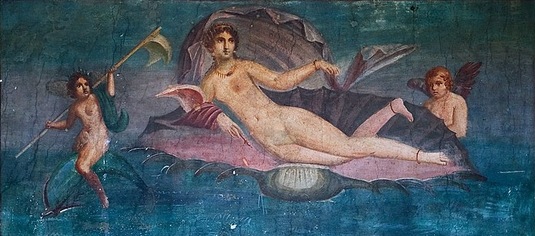Adventure ‘avant la lettre’: Narrative and Wandering in the Ancient Novel
Religious Studies, FU Berlin
Principal Investigator: Prof. Dr. Susanne Gödde
Doctoral researcher: Nathalie Schuler
Aphrodite Anadyomene with Erotes, fresco from Pompey, first century AD.
In this project, the five fully extant ancient Greek novels of adventure and romance (Chariton, Xenophon of Ephesus, Longus, Achilles Tatius, and Heliodorus) are to be subjected to a new reading which will bring to light fundamental components in the development and poetics of the European novel. An analysis of this material through the lens of the narratological, psychological, ethical, political, and aesthetic category of adventure promises to offer a fresh and innovative understanding of the ancient novel, whose significance for the formation of the adventure genre has previously been neglected in the otherwise extensive scholarship. One of the starting points and central theses of this project is that a particular narrative pattern (which was to remain popular well into the early modern period and beyond) is closely dependent upon the characters’ experiences of ‘adventure’ avant la lettre in the ancient novel, and in this respect founds what could be called 'adventurous narration'. The themes of love, adventure, and narration are thereby closely interlaced with one another.
A phenomenology of adventure in antiquity is to form the foundation of the project. This phenomenology will be developed by analysing five aspects of the ancient novel: 1. Semantic fields, 2. The relationship of the novel to mythology and epic poetry, 3. Discourses of uncertainty (e.g. war, sea-voyages, travel, foreignness and otherness, fate), 4. The Bachtinian theory of 'adventure-time', and 5. The imperial (or, rather, cosmopolitan) setting of adventure. The phenomenology will then be used for a ‘philology of adventure’ to examine how ancient novels think about and construe patterns of ‘adventure experiences’ as mechanisms of an artful and artificial narrative order – one which has as its fixed, but sometimes subversively varied telos a happy ending.
On this basis, two closely related areas of research will be pursued. The first (that of the applicant) will focus on the ‘arranged contingency’ which determines the narrative pattern of the ancient novels. Religious (i.e. divine, providential, fortuitous or contingent) aspects which act as structural principles in the adventures will here receive especial attention. The second area of research (that of the prospective doctoral student) will concentrate on the interdependent relationship between the discourses of love and adventure as well as the implications of their interconnectedness for gender theory. Both narrative theory and discourse analysis will be incorporated into this part of the project: the idealisation and idealogisation of virginity (a topos requiring precise contextualisation), which continually leads to love's fulfilment being deferred in the novel, finds its counterpart in the reader’s feelings of tension and suspense, and deliberately inspires a ‘pleasure for the text’ and the act of ‘reading for the plot’.


